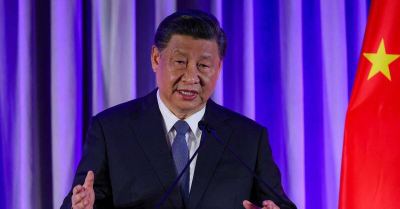Reuters-Dining with US firms at APEC Xi says China is ready to be a partner
November 16, 2023 4 min 829 words
这则报道描绘了习近平在APEC峰会期间与美国企业家晚宴的场景,他表示中国愿意成为美国的伙伴,寻求双边合作。报道强调了习近平在演讲中的乐观态度,与华盛顿对中国持负面看法形成鲜明对比。不过,报道也涉及了与习近平会面的美国高官及企业家对晚宴门票高昂的争议。这一报道突显了中美经济和地缘政治竞争中企业面临的压力。在这一背景下,习近平强调中国永远不谋求霸权,不进行冷战或热战。报道的中心在于习近平试图通过这一公关活动,向美国企业和公众展示他的亲和力,并回应中国在吸引外国投资方面的困境。整体而言,这次晚宴是中美关系复杂性的一个缩影,它既是经济合作的机遇,也反映了两国之间的矛盾与竞争。
China is ready to be a partner and friend of the United States, and there is plenty of room for bilateral cooperation, President Xi Jinping told American executives in San Francisco on Wednesday, as Beijing looks to reassure global business and counter his country's struggles to entice foreign investment.
The U.S. executives dined with Xi on the margins of the Asia-Pacific Economic Cooperation (APEC) forum following a day of talks between the Chinese leader and U.S. President Joe Biden, aimed at steadying relations between the world's two largest economies.
Xi received a standing ovation as he entered the room, and two more before and after he took the stage to speak.
The world needs China and the U.S. to work together, and it is wrong to view China as a threat and play a zero-sum game against it, Xi said in a speech to the audience, including some hand-picked by Beijing.
"Whatever stage of development it may reach, China will never pursue hegemony or expansion, and will never impose its will on others. China does not seek spheres of influence, and will not fight a cold war or a hot war with anyone," Xi said.
He assured his audience that "no matter how the global landscape evolves, the historical trend of peaceful coexistence between China and the United States will not change."
Xi's optimistic tone toward relations with the U.S. was at odds with the negative chorus of voices in Washington, where the U.S. Congress finds unusual bipartisan consensus in the need to counter Beijing.
The high-security dinner was a chance for companies to hear directly from China's leader as they search for ways to navigate China's economic slowdown, a U.S. push to "de-risk" some American supply chains away from China, and uncertainty caused by China's expanding security rules.
Executives from U.S. corporate giants such as Apple's (AAPL.O) Tim Cook, BlackRock's (BLK.N) Laurence Fink, Broadcom's (AVGO.O) Hock Tan, Bridgewater Associates' Ray Dalio and Pfizer's (PFE.N) Albert Bourla were at the dinner tables.
Xi also met Tesla (TSLA.O) CEO Elon Musk, telling him that he supports the company's development in China, according to a statement from the auto maker's Weibo Account on Thursday.
The dinner, where courses served included coffee-crusted black angus flat iron steak and a vegetable curry with squash and rice, attracted nearly 400 people, including government officials and academics.
But Xi directed much of his speech toward the American people and spent little time on commercial relations with the U.S.
"I would like to let you know that China sympathizes deeply with the American people, especially the young, for the sufferings that fentanyl has inflicted upon them," he said.
Biden and Xi earlier reached an agreement on working together to curb fentanyl production.
U.S. Commerce Secretary Gina Raimondo and other senior U.S. officials also attended the event, which generated controversy due to reported high ticket costs for companies seeking to brush shoulders with Xi.
Mike Gallagher, the Republican chairman of the U.S. House of Representatives' select committee on China, had called it "unconscionable" that U.S. companies would pay thousands of dollars to join a dinner with a government the United States says is committing genocide against Muslim Uyghurs.
Gallagher sent a letter on Monday to the hosts – the U.S.-China Business Council and the National Committee on U.S.-China Relations – demanding a complete list of individuals and companies that purchased tickets to the dinner.
Analysts have said Xi's speech alone is unlikely to dramatically alter U.S. business sentiment about China.
U.S. and Chinese officials have often described bilateral business and trade relations as the ballast in otherwise contentious ties with the U.S. But the growing economic and geopolitical rivalry between the superpowers has placed companies from both countries in the crosshairs of the other's government.
China has grown more suspicious of engagement with Western companies, in line with Xi's emphasis on self-reliance and national security, and this year it has cracked down on some U.S. consultancy and due-diligence firms, further damaging investor confidence.
But Gary Dvorchak, whose family hosted Xi in Iowa in 1985 as a young Chinese official, and who was invited by Beijing to attend the dinner, said Xi's appearance was savvy public relations, allowing the ruling Communist Party to show his appeal to regular people.
"It humanizes him and it gives him an ability to show a connection to the American people and bypass the American media," Dvorchak said.

